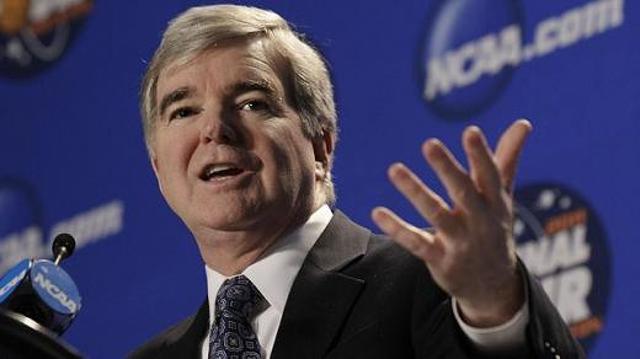For the first time in over a month — and the first time in the new year — there’s some action in the Paterno lawsuit filed against the NCAA.
The Paterno estate, along with former Penn State football coaches Jay Paterno and William Kenney, are suing the NCAA, its president Mark Emmert, its former chairman Edward Ray, and Penn State for alleged breach of contract and defamation. They are seeking damages related to the defamation charge, which the coaches argue has hampered their careers and job opportunities.
In the most recent smattering of court filings, motions, and briefs of which six were filed on Monday, the NCAA continues to demand discovery from the Paterno estate, particularly related to its ‘Critique,’ which is essentially a counterargument to the Freeh Report and a defense of Joe Paterno’s actions.
NCAA attorney Thomas Scott wrote in a filing that the NCAA has made a number of unsuccessful attempts to resolve the discovery issues, putting in a ‘good faith effort’ without involving intervention of the court. However, Scott said that the time has come for the court to urge the Paterno estate along in releasing documents related to the Critique, including the Thornburgh Report, the Clemente Report, and other Paterno arguments against the Freeh Report.
Scott said that the Paterno’s arguments against complying with the NCAA’s discovery requests are in direct contradiction with the requests they’ve made of the NCAA and law firm Pepper Hamilton, which has acquired Freeh’s firm. In other words, Scott and the NCAA believe that the Paterno estate is being hypocritical in its handling of pre-trial discovery.
‘At the same time the NCAA has been seeking discovery related to the estate’s Critique, plaintiffs have waged an aggressive campaign to obtain all documents relating in any way to the Freeh Report, based on arguments that are flatly inconsistent with their refusal to provide the NCAA its request discovery,’ Scott said.
He went on to point out that Pepper Hamilton has produced approximately 161,381 pages of material in response to discovery requests related to the Freeh Report, while the estate has produced only 332 pages related to the Critique, not including any internal e-mails, drafts, or interview notes.
In response to the Paterno’s arguments, Scott said that the Critique documents are not covered by attorney-client privilege because none of the attorneys retained were being used for legal advice, rather being retained to assist in creating a public report.
‘The estate and the authors of the Critique have made no secret of the fact that their work was prepared with the express intent that it would be made public,’ Scott said.
Scott went on to quote the Critique’s intro, which explicitly states that ‘[the Paternos] committed to complete transparency of our findings and those of the independent experts.’
The Paternos also made a request of their own on Monday, asking for a 60-day extension on all discovery requests as a result of the court’s ruling on documents designated as ‘highly confidential — attorneys eyes only’ by Pepper Hamilton. The court ruled that the blanket designation was was improper, releasing 22,399 documents on Nov. 12. The plaintiffs have determined that additional depositions are necessary based on these documents, and considering that they will be undergoing depositions of their own, the estate feels that it needs the additional two months to fulfill discovery requests.
‘An extension is warranted to allow plaintiffs time to pursue discovery with the benefit of key documents that have just become available to them in the past month after a lengthy effort to obtain them,’ attorneys for the Paterno estate wrote.
The NCAA has already scheduled a deposition with Penn State’s director in the Office of Trademark and Licensing, and is in the process of scheduling depositions of Scott Paterno, Jay Paterno, and Sue Paterno.



